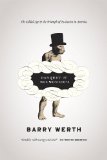Summary | Excerpt | Reviews | Beyond the Book | Readalikes | Genres & Themes | Author Bio
Great Minds, the Gilded Age, and the Triumph of Evolution in America
by Barry Werth

Critics' Opinion:
Readers' Opinion:
First Published:
Jan 2009, 400 pages
Paperback:
Apr 2011, 400 pages
 Book Reviewed by:
Book Reviewed by:
Micah Gell-Redman
Buy This Book
As Gray realized, Darwin intended Descent to smash both the science
and the morality of the polygenists, most notably Agassiz, a culture hero
alike to abolitionist Yankee intellectuals and Southern "niggerologists,"
who justified slavery upon the alleged God-given inherent inferiority
of Negroes. Agassiz discerned eight separately created human types -
Caucasian, Arctic, Mongol, American Indian, Negro, Hottentot, Malay,
and Australian - which he ranked in intelligence according to cranial capacity.
He disputed the doctrine of the unity of man - which was supported,
oddly, both by evolutionary logic and by the Holy Scriptures - as
"contrary to all the modern results of science."
After receiving his copy of The Descent of Man, Gray apologized in his
return letter for having had only time to read Darwin’s preface and conclusion,
and he promised not to examine the parts that might offend him
until "I can get a good pull at it." Checking around about Laura Bridgman,
he’d discovered that her doctor was in "San Domingo, one of those
Commissioners to see what sort of fellow citizens those tropical blacks
will make," and he vowed to keep after him. A month later, in mid-April,
Gray wrote Darwin again:
Almost thou persuadest me to have been "a hairy quadruped,
of arboreal habits, furnished with a tail and pointed ears" &c.
I have been besought to write notices of the book, but I decline.
You don’t know how distracted I am in these days - doing the work
of Professor, gardener, builder, financier and whatnot all at once.
But I must not let this mail pass without sending you the little I
could get as to Laura Bridgman. . . . I got the queries out to the
woman who now has personal charge of Laura [which] brought me
the enclosed - which I think I should not much rely on. When Dr.
Howe is on hand, some day, I will see if I can get anything authentic
and particular, - not, I fear in time for you.
"Things are going here furiously," Edward Livingston Youmans told Herbert Spencer, writing a week later from New York. As Gray was Darwin’s man in America, Youmans was Spencer’s, but incomparably more so; not an overextended academic, but a tireless lecturer, writer, editor, and impresario whose singular mission was to promote Victorian science - Spencer in particular - not only to scientists but to the education-obsessed working masses. It had been Spencer who in 1851 introduced the phrase "survival of the fittest," which even Darwin now employed in place of "natural selection" in the latest edition of Origin. "I have never known anything like it," Youmans went on:
Ten thousand Descent of Man have been printed and I guess they are nearly all gone. . . . The progress of liberal thought is remarkable. Everyone is asking for explanations. The clergy are in a flutter. McCosh told them not to worry, as whatever might be discovered he would find design in it and put God behind it. Twenty-five clergymen in Brooklyn sent for me to meet them on a Saturday night and tell them what they should do to be saved. I told them they would find the way of life in Biology and in the Descent of Man. They said "very good" and asked me to come again at the next meeting of the clerical club, to which I went and was again handsomely resoluted.
That the Reverend James McCosh, the president of the College of
New Jersey (later Princeton) and a native Scot who’d become the semi -
official voice of American Presbyterianism, could reconcile human evolution
and Christianity with little moral or intellectual fallout was not unusual:
many on both sides of the divide between natural science and natural
theology, like Gray, saw evidence of each in the other and worked to
accommodate fact to faith, and vice versa. Spencer, who had beaten Darwin
to publication with similar theories yet received far less notice, reacted
less equably. He would breeze over these months in his memoir,
recalling decades later that they "furnish no incidents calling for mention,"
writing instead about having played billiards every afternoon and
"chattings" with old friends at the Athenaeum Club, where he’d recently
been elected. In truth, Spencer felt the stab of Darwin’s new upheaval
keenly, and he strove hard to downplay and disguise his feelings.
Excerpted from Banquet at Delmonico's by Barry Werth. Copyright © 2009 by Barry Werth. Excerpted by permission of Random House, a division of Random House, Inc. All rights reserved. No part of this excerpt may be reproduced or reprinted without permission in writing from the publisher.





The Funeral Cryer by Wenyan Lu
Debut novelist Wenyan Lu brings us this witty yet profound story about one woman's midlife reawakening in contemporary rural China.
Your guide toexceptional books
BookBrowse seeks out and recommends the best in contemporary fiction and nonfiction—books that not only engage and entertain but also deepen our understanding of ourselves and the world around us.